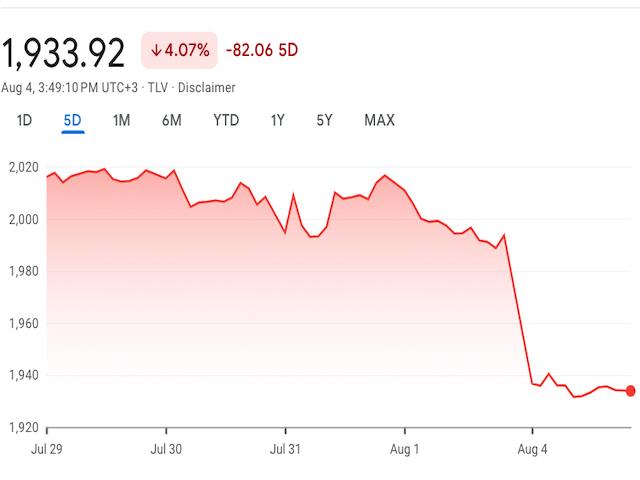Israeli markets took a significant hit on Sunday, reflecting not only the ripple effects of a global market downturn but also the looming threats from Iran and its regional proxies. The benchmark TA-35 stock index experienced a sharp drop of up to 2.7%, marking the steepest decline in a week. Though it managed to slightly recover, it remained down by approximately 2.5% shortly before 1 p.m. local time. It's important to note that the Tel Aviv Stock Exchange is closed on Fridays and Saturdays, meaning it often plays catch-up with global trends at the start of its trading week.
Global Market Turbulence and Regional Security Threats
Adi Babani, the head of international sales and trading at Meitav Investments Ltd. in Tel Aviv, attributed the market's volatility to two primary factors. First, the broader global market selloff that began at the end of last week, and second, the heightened security tensions following the twin strikes in Tehran and Beirut. "Tension from an Iranian reaction after the twin strikes in Tehran and Beirut is still in place, on top of the global market selloff," Babani noted.
Impact of US Market Declines
The slump in Israeli stocks mirrored the turbulence seen in the US markets on Friday, where weak employment data ignited fears of an economic slowdown. This, in turn, raised concerns that the Federal Reserve might not act swiftly enough to lower interest rates, further unsettling investors. The uncertainty and apprehension in the US markets undoubtedly spilled over into Israeli trading.
Tel Aviv stock exchange falls amid Iran tensions https://t.co/EjzBlnGkCx
— DaniGolani (@dani_golan1158) August 4, 2024
Anticipation of Iranian Retaliation
Compounding these economic worries is Israel's anticipation of a possible retaliatory attack from Iran, which has vowed to avenge the recent assassinations of key Hamas and Hezbollah leaders. Both Hamas and Hezbollah are designated as terrorist organizations by the United States, adding a layer of complexity and urgency to the situation.
Dual-Traded Technology Shares Hit Hard
The most significant declines were observed in dual-traded technology shares, which mirrored their substantial losses in New York on Friday. Nova Ltd. and Camtek Ltd., both pivotal players in the semiconductor industry, plummeted by 11% each. Meanwhile, Tower Semiconductor Ltd. and Nice Ltd. experienced losses of approximately 5%.
While the Tel Aviv Stock Exch. (TASE) has seen a reversal since July 31st, it's the USD/ILS that should draw the attention. After the Shekel dropped over .20 cents in 3 wks, another .28+ is almost a given unless cooler heads prevail. (Au contraire: IRR/ILS--underway). Mystified! pic.twitter.com/6NlDZhZ6Pk
— Kelly (@Ape_Crack) August 4, 2024
Economic and Security Perspectives
Ronen Menachem, the chief markets economist at Mizrahi Tefahot Bank Ltd., emphasized that the downturn was driven by the sharp drops in the US markets and the "tremendous security tensions" in Israel. "The market is expected to continue to be very nervous," Menachem stated.
Investors are currently torn between two potential scenarios. In the first, the ongoing escalation could further damage local economic activity and potentially spread to international markets. In the second scenario, pressure from Israel's allies could lead to a cease-fire in Gaza, allowing Israeli shares to return to a trend of price increases and possibly even outperforming international markets. It's worth noting that the TA-35 index reached a record high less than a month ago, demonstrating its potential for resilience and recovery.
The main index of the Tel Aviv Stock Exchange (TASE) fell to its lowest point since April at the start of weekly trading on Sunday, driven by fears of a potential war with Hezbollah and Iran.
— Yeni Şafak English (@yenisafakEN) August 4, 2024
In early trading, the TASE 35 index dropped 2.3% to 1,937 points, marking its lowest… pic.twitter.com/WeKIcBLxf0
Regional Repercussions
The regional tensions also reverberated across other Middle Eastern stock markets, including those in Egypt and Saudi Arabia, as they started their new trading week. These markets too felt the impact of the heightened security concerns and global economic instability.
Conclusion
The combination of global economic uncertainties and regional security threats has created a volatile environment for Israeli markets. Investors and analysts alike are closely monitoring the situation, hoping for stability and potential recovery amidst the turbulence.


